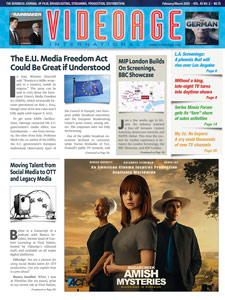In 2015, veteran TV broadcaster, producer, satellite TV pioneer, and content distributor Robert Chua Wah-Peng decided to write a 130-page self-published book to commemorate his 50 years in the TV business in Australia, Singapore, and Hong Kong.
Even though it is an unusual book — in the sense that is has a Quick Response (QR) code on every page; he even renamed it a “Quick Response Book” or QRB — and has plenty of caricatures (apparently Chua was, for a time, Southeast Asian cartoonists’ favorite subject), it was very useful to this journalist when writing this Hall of Fame feature. It only took one month to write this piece. Previous Hall of Fame features have taken three months or more.
Chua’s autobiography contains an abundance of facts, dates, and tidbits. (It’s clear, however, that the book was written without the assistance of a journalist or a ghostwriter.) All that info saved this reporter from having to spend weeks on end doing time-consuming research. All that was needed was to cross-reference and fact-check certain bits of information. A couple of face-to-face interviews were also conducted over the years, and some family background not included in the book was covered through e-mail.
VideoAge last met with Robert Chua in Cannes during MIPCOM 2019 at Caffé Roma, where he traditionally holds court at both MIP-TV and MIPCOM. There, Peggy, his wife of 45 years, from whom he is inseparable, good-naturedly grumbled about Chua having lost his driver and her being forced to travel throughout Hong Kong by taxi, while Robert described some of his new TV projects for his invited lunch guests.
The former Peggy Jen Ping Ping was the last of Robert’s assistants at the Hong Kong TV station TVB, where he worked for six years (until 1973). Peggy had joined TVB in 1967 at the age of 17, starting as a receptionist. In 1974, Chua and Peggy started Robert Chua Productions (RCP), where they employed 23 people. In 1975, the couple produced 26 episodes of Audio Visual Robert Chua for RTV. And in 1977, they produced Asia Singing Contest, also for RTV, which became a big hit.
TVB was incorporated in 1965, and two years later began broadcasting in both Cantonese (TVB Jade) and English (TVB Pearl). The two stations were promoted as “Wireless Television” in order to distinguish them from cable service Rediffusion Television (RTV), which became a broadcast station in 1973, and was renamed Asia Television (ATV) in 1982. TVB was co-founded by Run Run Shaw (a Hong Kong entertainment mogul), Douglas Clague (a British soldier in Hong Kong), and Harold Lee Hsiao-wo (a Hong Kong businessman).
RTV was founded in 1949 by BET, a British company, as a wired radio station. In 1957, it added subscription TV services in both Chinese and English. After going through several owners, ATV ceased operation as a broadcast station in 2016.
Looking at the Chuas’ 1974 wedding pictures, one cannot help but marvel at the movie-star looks of Peggy, while Robert, who then wore a pair of oversized square eyeglasses, has become more handsome with age. Nonetheless, Peggy remembered with a smile that her “parents were relieved that their daughter did not marry a [then socially-unacceptable] Caucasian,” which they felt was a possibility due to her stunning beauty and frequent travels to Europe and the U.S. to check on the family’s real estate investments.
Another curious bit is Chua’s explanation for both his and Peggy’s American accents despite the fact that they both hail from two former British colonies: “[After] over 30-plus years of attending MIP-TV and MIPCOM, our many American friends have [obviously] made a lasting impact.”
VideoAge first met the Chuas in Hong Kong in 1994 when Robert was running China Entertainment Television Broadcast (CETV). He had founded the 24-hour satellite TV station, which focused on Mainland China, using the Putonghua language (standard Mandarin) that same year. On the occasion of the inaugural MIP Asia — the first TV trade show in Asia, which took place November 30-December 2 and was organized by Reed MIDEM — Robert and Peggy hosted a reception in their house to introduce CETV to Western MIP Asia participants. To make it a Western event, the Chuas (following the advice of former 20th Century Fox president Alan Silverbach) engaged PR agent Steve Syatt, who had left LBS, a distribution company in New York City, to open his own PR firm in Los Angeles.
MIP Asia only lasted four years. In 1998, it was moved to Singapore and renamed Asia TV Forum. It’s now run by Reed MIDEM’s corporate division, Reed Exhibitions.
AOL Time Warner became a CETV shareholder in 2001. Two years later, CETV was acquired by TOM Group, the Hong Kong-based Chinese-language media conglomerate. TOM Group closed CETV, Asia’s first satellite channel, in 2016.
Chua had originally settled in Hong Kong, then a British colony, in 1967 at the age of 21, moving from his native Singapore where he’d worked as a producer at Radio and Television Singapore (RTS), the first television station in Singapore. The public station began in 1963 as Television Singapura, and two years later merged with public Radio Singapura to form RTS. After several rebrandings and reorganizations, it became MediaCorp, a public broadcast conglomerate, in 1999.
Naturally, Chua’s move to Hong Kong was recorded by an article in Singapore’s newspaper, Eastern Sun, as it was considered a big news event. The two cities are in the same time zone, just a four-hour flight away from each other.
In his book, Chua explained that he left for Hong Kong when the colony was caught up in the midst of China’s Cultural Revolution (1966-1972). He grew up in a Singapore, which, in 1946, the year Chua was born, was declared a U.K. colony. He left it after Singapore became an independent republic in 1965. However, when he reached Hong Kong in 1967, the British colony was besieged by Chinese Communist guerrillas, and police armed with tear gas patrolled the streets constantly.
Thirty years later, Chua also witnessed another British handover, that time to China. Hong Kong became a British colony in 1842, and 156 years later it was returned to China due to a 99-year lease (which ended in 1997) that was negotiated with China in 1898. Now, 23 years after the handover, China is, once again, trying to put the former colony under its dictatorial thumb, sparking violent demonstrations and clashes between police and residents. This time, however, the police aren’t fighting the Communists, but the residents.
Chua stated that neither handover affected his television business because they happened before Internet, streaming, mobile phones, and social media came into play.
Chua’s TV career started at ADS-7, a TV station in Adelaide, Australia, just after he graduated from Adelaide’s King’s College in 1964. He returned to Singapore in 1966 to work for Radio and Television Singapore before leaving for Hong Kong.
Both journeys had their own stories: “I went to Australia because the mother of my Anglican pastor returned to Adelaide and promised to mentor me,” Chua said. “I went to Hong Kong because I didn’t see opportunities in Singapore and by chance I heard that Hong Kong was about to start its first TV station. I applied and got the job to help start up TVB.”
“My interest in television,” he explained, “started in 1963 when I heard that Singapore was about to start its first broadcast TV station.” Chua’s family was in the clothing business, manufacturing their own brand of children’s wear. The only family member in show business, Chua recalled, “was my grandfather on my mother’s side who produced Chinese stage opera, the so-called chiu cho opera.”
In Hong Kong, where he was nicknamed the “Whiz-kid,” Chua launched the variety show Enjoy Yourself Tonight (or EYT) on TVB, which became one of the world’s longest-running live shows, lasting for 28 years. He also produced the Miss Hong Kong beauty pageant show in 1973.
In 1976, Chua was the first to introduce videotapes for home use into Hong Kong and opened a Video Centre to convert Chinese films for VHS and Betamax video players.
When China opened up to foreign TV advertising in 1979, Chua started the first advertising agency, which worked with Guangdong Television (in the province of Guangdong, north of Hong Kong), and promoted Citizen watches.
In 1983, Chua started to regularly commute between Hong Kong and Singapore, which he did for six years, to run Singapore’s Hoover Live Theatre. The venue, originally called the Shaw Brothers Theatre, was taken over by Chua and his partner CL Ding, and featured local Hong Kong and Taiwanese performances. While going back and forth from Singapore to Hong Kong, Chua also produced Guess Who’s Coming To Yum Cha, an English-language situation comedy for Hong Kong’s TVB Pearl.
In 2003, with his own production company, Chua then produced the interactive quiz show Everyone Wins, which aired in Shanghai, Hong Kong, Taiwan, Singapore, and Vietnam. A year later he created an interactive online TV channel, Health & Lifestyle, which is no longer active.
Chua went back to production in 2015 with the reality show Someone Who Cares for Hong Kong TVB-2. A year earlier he was appointed to the board of advisors of RTHK, Hong Kong’s public broadcaster, which was known as GOW from 1928 until 1976, and now operates seven radio stations and three TV channels.
In 2013, Chua ventured into the food and beverage business by opening the “Tim Ho Wan” restaurant in Singapore, which became a franchise with over 40 outlets throughout Asia. In 2015, Chua opened “A La Bakery” in Hong Kong. In 2016, he acquired the franchise rights for “Kam’s Roast Goose” restaurant in Singapore, and in 2018 he acquired the international franchise rights for the “Ju Xing Home” restaurants.
The popularity of Chua’s restaurants is astonishing. In 2013, during a break from the Asia TV Forum, Chua took a group of Western attendees at the Singapore market to his “Tim Ho Wan” restaurant, where they witnessed a line stretching around the building and what could have been a four-hour wait for a table. Fortunately, the boss’s presence meant that the group didn’t have to wait very long. They were quickly whisked into a private room.
(By Dom Serafini)
Audio Version (a DV Works service)












Leave A Comment